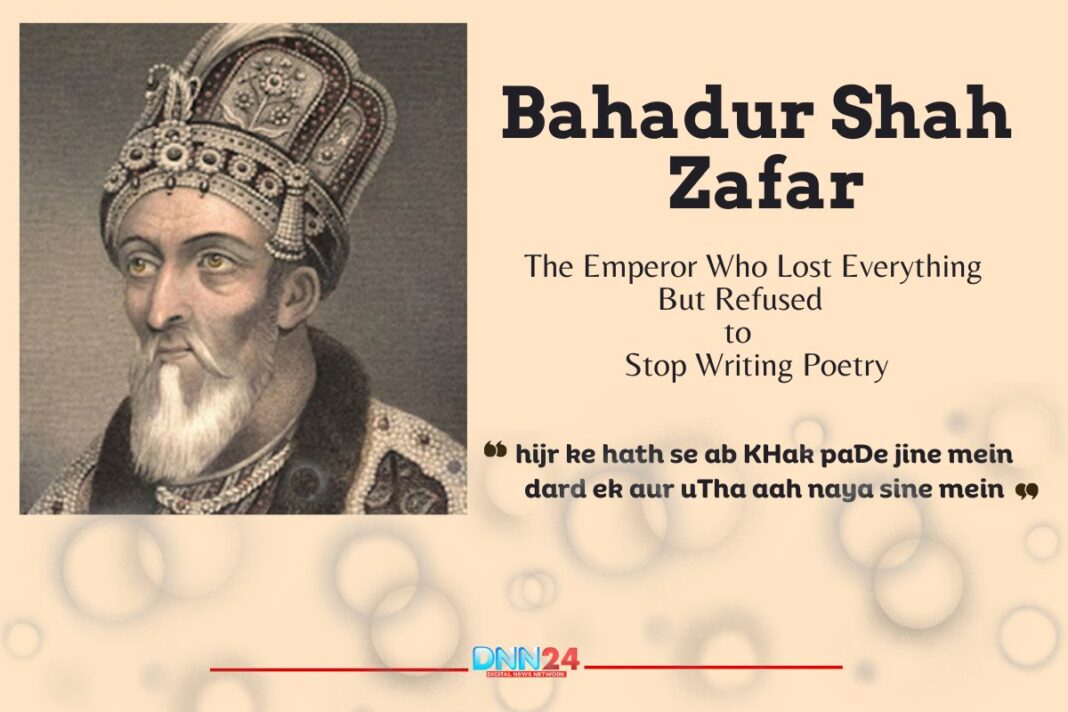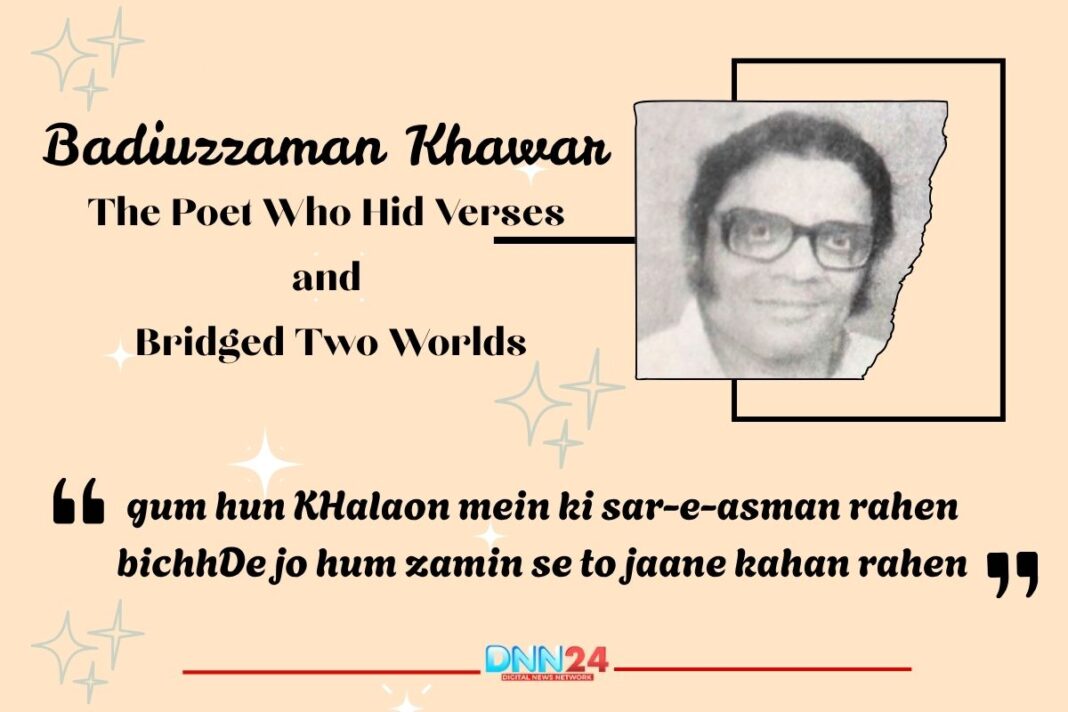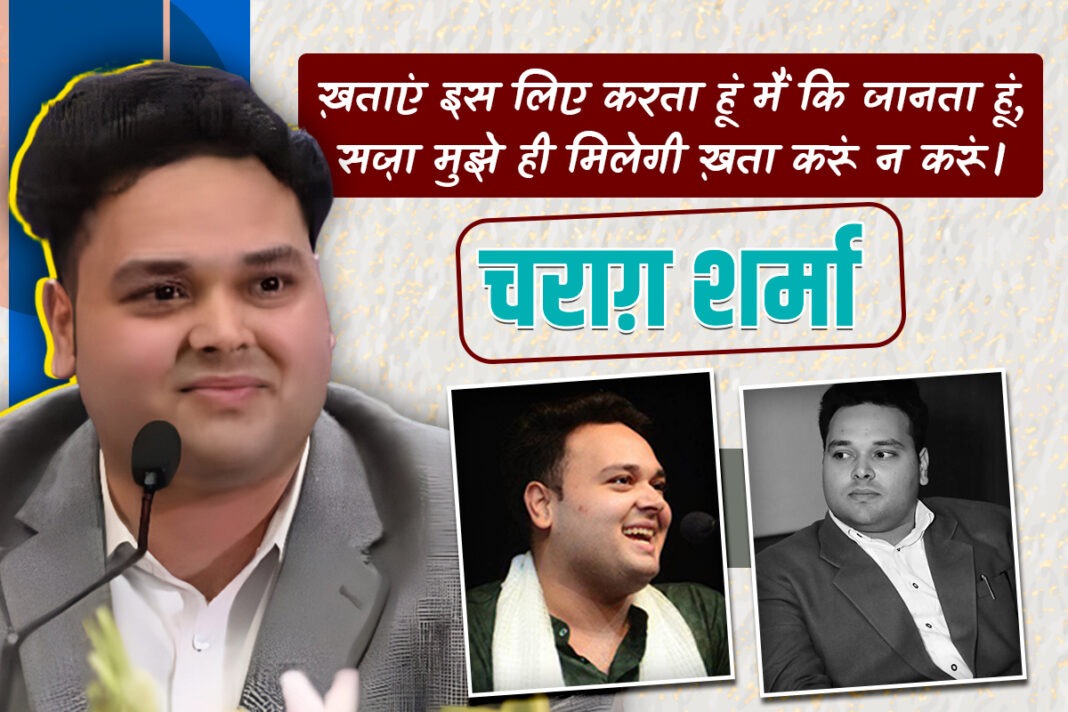What happens when an empire crumbles, but the man wearing the crown refuses to let his spirit break? Bahadur Shah Zafar, the last Mughal emperor, lived this impossible reality. While history remembers him as a defeated king, the real story reveals something far more profound: a poet who transformed suffering into art, a leader who chose compassion over revenge, and a man who fed hundreds even when he was starving himself. His life was not about losing an empire. It was about finding strength in the smallest acts of humanity when everything else was taken away.
baat karni mujhe mushkil kabhi aisi to na thi
Bahadur Shah Zafar
jaisi ab hai teri mahfil kabhi aisi to na thi
The Boy Who Chose Verses Over Crowns
Born in Delhi in 1775, young Zafar grew up in a household where expectations ran high, but his heart wandered elsewhere. His father, Akbar Shah II, hoped to raise a ruler. His mother, Lalbai, watched her son drift toward poetry, music, and quiet contemplation instead. While other princes practiced statecraft and military strategy, Zafar spent hours absorbed in Persian and Arabic literature, losing himself in words that would later become his only weapon.
lagta nahin hai dil mera ujDe dayar mein
Bahadur Shah Zafar
kis ki bani hai aalam-e-na-paedar mein
The irony of his childhood remains striking. Zafar trained in horse riding and archery, becoming recognized as one of the three finest horse riders in all of India alongside his brother Mirza Jehangir. His physical prowess was undeniable. Yet these skills, symbols of royal birth and warrior heritage, would never define his reign. Instead, his gentle nature and artistic temperament shaped everything he touched.
bhari hai dil mein jo hasrat kahun to kis se kahun
Bahadur Shah Zafar
sune hai kaun musibat kahun to kis se kahun
He handwrote copies of the Quran to send to mosques across the region, each letter carefully crafted as an act of devotion and piety. His palace became a gathering place for the greatest literary minds of the era, including Mirza Ghalib, Daagh Dehlvi, Zauq, and numerous others who found patronage and friendship under his roof.
ya mujhe afsar-e-shahana banaya hota
Bahadur Shah Zafar
ya mera taj gadayana banaya hota
One detail from those days speaks volumes about his character. Every afternoon, when Zafar’s spoon touched the kheer during his meal, it served as a signal. Within moments, palace servants would distribute rice to hundreds of beggars waiting outside the gates. This ritual, barely mentioned in history textbooks, reveals the man behind the title.
nahin ishq mein is ka to ranj hamein ki qarar o shakeb zara na raha
Bahadur Shah Zafar
gham-e-ishq to apna rafiq raha koi aur bala se raha na raha
Even in his youth, Zafar understood that power was meaningless if it could not alleviate the suffering of ordinary people. His poetry, written under the pen name “Zafar,” explored themes of love, mysticism, and a peculiar sadness that seemed to foreshadow the loneliness that would ultimately be his fate. Looking back, his verses read like prophecies written in metaphor.
mohabbat chahiye baham hamein bhi ho tumhein bhi ho
Bahadur Shah Zafar
KHushi ho is mein ya ho gham hamein bhi ho tumhein bhi ho
An Emperor Who Ruled Nothing
In 1837, Zafar ascended to the throne at the age of 62. By then, the Mughal Empire existed only in name. British control had reduced centuries of imperial glory to a single city: Delhi. Even within those boundaries, Zafar possessed no absolute authority. He lived as a pensioner, receiving a stipend from the British East India Company and requiring their permission for every expense, every decision, every attempt to maintain the dignity of his position.
hum ye to nahin kahte ki gham kah nahin sakte
Bahadur Shah Zafar
par jo sabab-e-ghum hai wo hum kah nahin sakte
History books refer to him as the last Mughal emperor, but the truth is more complex. He was an emperor on allowance, a sovereign without sovereignty, a king who ruled over nothing but fading memories.
jigar ke TukDe hue jal ke dil kabab hua
Bahadur Shah Zafar
ye ishq jaan ko mere koi azab hua
The humiliation was constant and deliberate. Zafar could not bestow titles on deserving subjects. He could not command armies or even organize traditional festivals without outside approval. British officers watched his every move, ensuring he remained decorative rather than functional.
shamshir-e-barhana mang ghazab baalon ki mahak phir waisi hi
Bahadur Shah Zafar
juDe ki gundhawaT qahr-e-KHuda baalon ki mahak phir waisi hi
This daily erosion of dignity would have broken most men, but Zafar responded in a different way. Rather than fight battles he could not win, he transformed his court into something the British could not touch: a sanctuary for art, poetry, and cultural preservation.
itna na apne jame se bahar nikal ke chal
Bahadur Shah Zafar
duniya hai chal-chalaw ka rasta sambhal ke chal
Yet even within his own household, safety eluded him. Palace intrigue turned deadly when his own son, Mirza Qaimur, poisoned Zafar’s beloved paan with tiger hair powder. Jealousy over succession drove family members to betray him. The incident reveals how isolated Zafar truly was. Enemies surrounded him outside the palace walls.
dekho insan KHak ka putla bana kya chiz hai
Bahadur Shah Zafar
bolta hai is mein kya wo bolta kya chiz hai
Danger lurked within them. Trust became a luxury he could not afford. Through it all, he continued to host poetic gatherings, creating a space for creative souls seeking unity and solace in an increasingly fractured world. His verses from this period overflow with pain, helplessness, and longing for a homeland he nominally ruled but could never truly govern.
kafir tujhe allah ne surat to pari di
Bahadur Shah Zafar
par haif tere dil mein mohabbat na zari di
The Reluctant Revolutionary
May 1857 changed everything. India’s first War of Independence erupted across the north, and suddenly, revolutionaries needed a symbol. They found one in the aging, reluctant poet-king living in Delhi. Rebel soldiers arrived at the palace, begging Zafar to lead them, to lend legitimacy to their cause by becoming their figurehead.
kya kuchh na kiya aur hain kya kuchh nahin karte
Bahadur Shah Zafar
kuchh karte hain aisa ba-KHuda kuchh nahin karte
The moment was impossible. Zafar, a man who had spent decades avoiding conflict and choosing art over aggression, now faced a choice that would define his legacy forever. He agreed, but the decision tortured him. Stories from those chaotic months paint a picture of a leader who was constantly anxious, perpetually doubtful, and sought advice from his physician and poets rather than military commanders.
wo sau sau aTkhaTon se ghar se bahar do qadam nikle
Bahadur Shah Zafar
bala se us ki gar us mein kisi muztar ka dam nikle
Zafar possessed no real talent for warfare. He struggled to unite the various rebel factions, each with its own agenda and grievances. His symbolic presence mattered enormously to the legitimacy of the uprising, but his actual influence over military decisions remained minimal. He was a figurehead thrust into revolution, not a revolutionary who chose his path.
na darweshon ka KHirqa chahiye na taj-e-shahana
Bahadur Shah Zafar
mujhe to hosh de itna rahun main tujh pe diwana
When British forces recaptured Delhi, the consequences arrived swiftly and brutally. Zafar and his remaining family fled to Humayun’s Tomb, seeking refuge in the monument of his ancestors. There, in one of history’s cruelest moments, British soldiers executed his sons and grandson before his eyes.
TukDe nahin hain aansuon mein dil ke chaar panch
Bahadur Shah Zafar
surKHab baiThe pani mein hain mil ke chaar panch
The emperor, who had spent his life promoting religious tolerance and artistic expression, watched his family murdered as punishment for a rebellion he barely controlled. Charged with treason, stripped of every remaining shred of dignity, Zafar was exiled to Rangoon in Burma. The image of him leaving Delhi, broken but unbowed, remains seared into Indian memory. An emperor reduced to a prisoner, carrying nothing but his grief and his pen.
hote hote chashm se aaj ashk-bari rah gai
Bahadur Shah Zafar
aabru bare teri abr-e-bahaari rah gai
Words Written in Exile
Rangoon became Zafar’s final home, though calling it a home feels wrong. It was a prison far from everything he loved. He was 82 years old when he arrived, having lost his sons, his empire, his homeland, and his freedom. Most men would have surrendered to despair. Zafar did something extraordinary instead. He continued writing poetry.
nibah baat ka us hila-gar se kuchh na hua
Bahadur Shah Zafar
idhar se kya na hua par udhar se kuchh na hua
His most famous ghazal emerged from these years of isolation: “Na kisi ne humara dard samjha, na kisi ne humari dastan suni.” The words translate to an aching cry: no one understood my pain, no one heard my story. Yet, within that expression of abandonment lies something powerful. Zafar refused to stop creating beauty. He transformed suffering into art, grief into verses that would outlive empires.
hum ne teri KHatir se dil-e-zar bhi chhoDa
Bahadur Shah Zafar
tu bhi na hua yar aur ek yar bhi chhoDa
His poems from exile speak of motherland, love, and longing, but they transcend personal tragedy. They voice the universal human experience of loss and the courage required to keep hoping when hope seems foolish.He died in Rangoon in 1862 at age 87, buried far from the city he loved. His grave, modest and unremarkable at first, would eventually become a shrine visited by Indians seeking a connection to their history.
ishq to mushkil hai ai dil kaun kahta sahl hai
Bahadur Shah Zafar
lek nadani se apni tu ne samjha sahl hai
But Zafar’s true legacy was never his burial place. It lives in his words, in the poetry that continues inspiring anyone who feels crushed by circumstance yet refuses to abandon their dreams. His writings prove that sometimes the most significant resistance comes not through violence but through persistent creativity, through making art when the world insists you should despair.
ye qissa wo nahin tum jis ko qissa-KHwan se suno
Bahadur Shah Zafar
mere fasana-e-gham ko meri zaban se suno
The Lessons Hidden in History
Most history books reduce Bahadur Shah Zafar to a footnote: the last Mughal emperor, defeated in 1857, exiled and forgotten. They miss the revolutionary truth hidden in his story. Zafar’s life demonstrates that power takes many forms. When he lost political authority, he built cultural influence. When family betrayed him, he created a community through art. When the British took his kingdom, he nurtured something they could never touch: the human capacity for beauty, generosity, and hope.
galiyan tanKHwah Thahri hai agar baT jaegi
Bahadur Shah Zafar
aashiqon ke ghar miThai lab shakar baT jaegi
His palace fed hundreds of beggars daily, even as resources dwindled and British oversight tightened. His court welcomed both Hindu and Muslim poets, fostering communal harmony that still echoes through Urdu literature and South Asian culture. These were not grand gestures or calculated political moves. They were simple acts of humanity performed consistently, quietly, without expectation of reward. Zafar understood what many leaders never grasp: actual influence comes not from commanding armies but from touching hearts.
main hun aasi ki pur-KHata kuchh hun
Bahadur Shah Zafar
tera banda hun ai KHuda kuchh hun
The untold stories of his life matter precisely because they are small. The poisoned paan. The signal given by a spoon touching kheer. The poetry written in exile by candlelight. These details reveal character in ways that battle accounts never could. They portray a man who maintained his dignity when everything else was stripped away, who chose creativity over bitterness, and who transformed personal tragedy into universal art.
gai yak-ba-yak jo hawa palaT nahin dil ko mere qarar hai
Bahadur Shah Zafar
karun us sitam ko main kya bayan mera gham se sina figar hai
Today, Zafar’s poetry remains alive in concerts, in literature, and in the memories of people who find their own struggles reflected in his words. His legacy teaches that sometimes history’s greatest heroes are not those who triumph, but those who face impossible hardship and continue to create beauty anyway.
sab rang mein us gul ki mere shan hai maujud
Bahadur Shah Zafar
ghafil tu zara dekh wo har aan hai maujud
His life was not about ruling an empire. It was about proving that even when you lose everything, you can still feed the hungry, inspire the broken, and write verses that outlast kingdoms. That is the real story of India’s last emperor: not how he fell, but how he refused to let his spirit break.
Also Read: Saqi Farooqi: The Rebel Poet Who Kept Urdu Alive in London
You can connect with DNN24 on Facebook, Twitter, and Instagram and subscribe to our YouTube channel.



